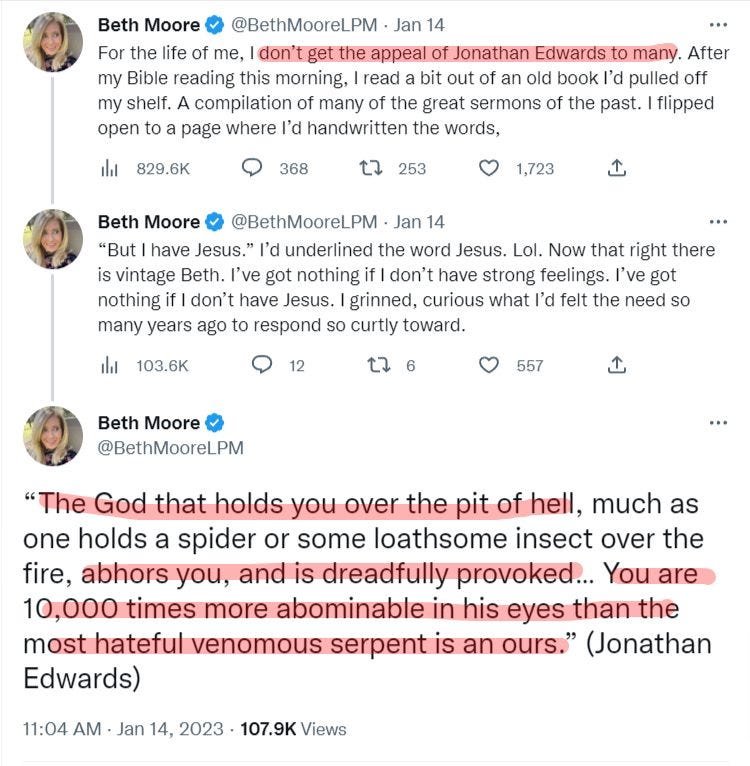Beth Moore Bashes Jonathan Edwards, then Acknowledges ‘I’m No Big Theologian’
Or even a little one
Beth Moore continues to share her bad theology from the Twittersphere, criticizing 18th-century American preacher Jonathan Edwards for his famous sermon “Sinners in the hands of an Angry God.”
For the uneducated, Moore’s theological ineptitude and outright horribleness are the stuff of legends, as she has routinely claimed direct revelation from God (like her famous tale of God telling her to brush a guy’s hair instead of witnessing to him), affirming so-called woman pastors and those who affirm LGBTQ+, labeling her entire denomination racist, and claiming white supremacy is running rampant” in the church. She has liked tweets dissuading believers from sharing the Gospel at BLM protests and recently said that the pulpit has become a threat to women’. She has criticized complementarianism, as ‘it wipes out half the gospel force’ and has begun preaching at churches.
Edwards, who preached the sermon to his own congregation in 1741 to stir them out of their complacency and theological stupor, would become known for this work, as it became the catalyst for the First Great Awakening, which brought revival across the colonies and Britain.
In the sermon, Edwards uses powerful, incredibly descriptive, and emotive language to convey the urgency and importance of repentance. No stranger to a bit of hyperbole, he argues that God’s wrath towards sinners is just and that eternal damnation in hell is a real possibility for those who do not turn to God in repentance. His message is simple: because salvation is not guaranteed, people need to be aware of the danger of their situation and take immediate action to turn toward God. The whole time, Edwards urges his listeners to examine their hearts, confess their sins, and seek salvation through Jesus Christ alone.
Yet in a series of tweets, Moore recoils at some of the vivid imagery Edwards employs, chastising him for suggesting that God abhors people before their salvation, instead offering her own view of the relationship between mankind and God- that Jesus is so merciful and beautiful, and because he is “alight with such holy love toward you” that his “confrontation gives you dignity you need to feel like maybe, in him—in his eyes—you’re worth saving.”
Moore’s view doesn’t mesh at all with Romans 5:10 “For if while we were enemies we were reconciled to God by the death of his Son, much more, now that we are reconciled, shall we be saved by his life.” or Philippians 3:18 “For many, of whom I have often told you and now tell you even with tears, walk as enemies of the cross of Christ. It doesn’t mesh with Ephesians 2, which says that by nature we are “children of wrath” and that, as Romans 1 says, the wrath of God is upon those without the righteousness of Christ.
We are enemies of God who deserve wrath and mercifully receive grace, not lovable louts who need to be convinced of how much God loves us for us to ascent to his hugs of salvation. Rather than robust doctrine, we get Moore’s squishy theology to chew on, which turns to ashes in the mouth.









